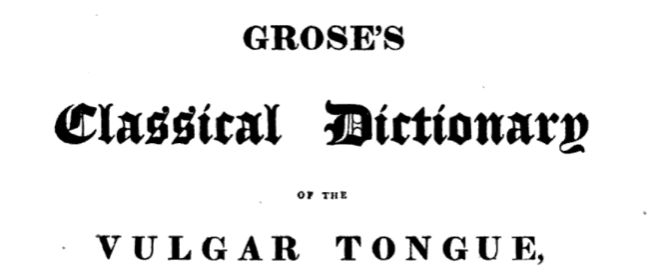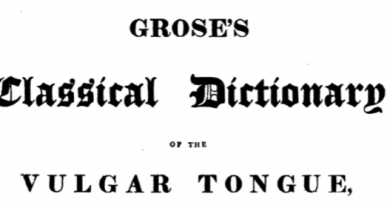Dictionary of the Vulgar Tongue – Day 272, 273 and 274
The Dictionary of the Vulgar Tongue was first published at the end of the eighteenth century, and given that the current health crisis is giving too much time to read books, I thought I’d pick a daily word from it until I got bored…. And to catch up after getting behind with these posts, and because I’m getting towards the end of the book, I’m doing three days at once now. How lovely….
Queen Street
Back to domestic affairs, Grose defines this as “a man governed by his wife, is said to live in Queen Street, or at the sign of the Queen’s Head”. The word ‘henpecked’, which was also in use at the beginning of the nineteenth century, is much more common now, but I’m slightly surprised this one didn’t remain in common usage for longer. Other than that, I can’t add much here, but I rather like the phrase.
Queer Plungers
This is one of Grose’s longer definitions, “cheats who throw themselves into the water, in order that they may be taken up by their accomplices, who carry them to one of the houses appointed by the Humane Society for the recovery of drowned persons, where they are rewarded by the society with a guinea each; and the supposed drowned persons, pretending he was driven to that extremity by great necessity, also frequently sent away with a contribution in his pocket”.
Firstly, the word ‘queer’ here was very common and used frequently in the canting (criminal underworld) community to mean something like odd, unusual, quirky or eccentric. So the origin of the phrase is just an eccentric jumper (of the diving kind, not the pullover kind….).
The Royal Humane Society had been founded in 1774, mostly at the initiative of William Hawes. He did indeed, at his own cost, provide a financial reward to anyone who brought to him someone who had fallen in the Thames and been rescued. It’s not hard to see where that plan could go wrong…. But, I assume they were aware of the potential problems and they could likely spot someone who was trying it on, although it strikes me as a brave thing to do in terms of jumping in the river in the first place.
On a most positive note, the Royal Humane Society themselves have details of what was achieved soon after they were launched, showing just how much good they’ve done. As for how common the queer plunging scam was, I can’t imagine that it happened all that much, but I can imagine it’d still happen today if it wasn’t for the fact that the Royal Humane Society no longer issue financial rewards.
Quick and Nimble
Grose defines this as “more like a bear than a squirrel. Jeeringly said to any one moving sluggishly on a business or errand that requires dispatch”. Firstly, I’m going to use Grose’s “more like a bear than a squirrel” at some point, that’s a beautiful turn of phrase.
The phrase’s meaning is self explanatory and it has remained in common usage since at least the eighteenth century. I prefer the bear and squirrel bit though.




